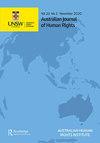Tribute to James Richard Crawford, delivered Jesus College Cambridge, Saturday 28 May 2022
Q1 Arts and Humanities
引用次数: 0
Abstract
James Crawford was a father, a husband, a sibling, a friend, a colleague. He was also the pre-eminent international lawyer of his age, a scholar, an advocate, an arbitrator and, at the end of his life, a judge. James was born in Adelaide, South Australia, in 1948, the first of seven children, his mother a nurse, his father a company director. There was law in the family, his maternal grandmother being only the second woman to graduate in law from the University of Adelaide. He came of age in the 1960s, already an independent spirit, a child, as he put it, of the ‘Vietnam generation’, already with an early republican instinct: as a schoolboy, he recalled, ‘I once had to sit in the sun for five hours waving my little flag and saw the Queen pass by for literally one minute... I was not terribly impressed’. He studied at Adelaide University (law, with history, English and international relations). The combination defined him, including a life-long interest in literature and words, but he opted for the law: a doctorate at Oxford and study under Professor Ian Brownlie. From the outset, he had an intensely pragmatic approach to the idea of an international rule of law—I am a ‘naïve positivist’, he once said, never himself much attracted to theory, but deeply respectful of others who were. The thesis became a book, on The Creation of States in International Law, today a classic that defines the field and would inform later engagements: Quebec’s secession from Canada; Scottish independence; and the decolonisation of Mauritius, including Chagos, from British colonial rule. Then back to Australia, as an academic: Adelaide, then Sydney. His interests broadened and deepened: he liked to challenge dogma—on the Australian Law Reform Commission he spearheaded the recognition of Aboriginal customary laws in Australia’s legal order. He qualified as a barrister, writing about Australian courts. He published the Rights of Peoples under international law, an early foray into matters of self-determination. You get the gist: rule or domination by others was a leitmotif of his intellectual style and product. In 1992, he returned to Britain as the Whewell Professor of International Law, and a fellowship at Jesus College Cambridge, a place he called home. A generation of international lawyers came to appreciate a mind that was sharp, witty, open, direct, engaged. He served as director of the Lauterpacht Centre for International Law, chaired the law faculty, and was a highly engaged teacher: his 70 doctoral students is surely a record. His protégés crossed culture, politics and identity, entering academic life across the globe, a lasting legacy for his ideal of international law as an ‘open system’: real, practical and forward向詹姆斯·理查德·克劳福德致敬,剑桥耶稣学院,2022年5月28日,星期六
詹姆斯·克劳福德是一位父亲、丈夫、兄弟姐妹、朋友和同事。他还是同时代杰出的国际律师、学者、辩护人、仲裁员,在他生命的尽头,他还是一名法官。詹姆斯1948年出生于南澳大利亚州的阿德莱德,是七个孩子中的第一个,母亲是护士,父亲是公司董事。家里有法律,他的外祖母是第二位从阿德莱德大学法律专业毕业的女性。他在20世纪60年代成年,已经是一个独立的精神,正如他所说,是“越南一代”的孩子,已经有了早期的共和本能:他回忆道,作为一个小学生,“我曾经不得不在阳光下坐了五个小时,挥舞着我的小国旗,看到女王经过了整整一分钟。。。我印象不深。他曾就读于阿德莱德大学(法律、历史、英语和国际关系)。这种结合定义了他,包括对文学和文字的终身兴趣,但他选择了法律:在牛津大学获得博士学位,师从伊恩·布朗利教授。从一开始,他就对国际法治的理念采取了非常务实的态度——他曾说过,我是一个“天真的实证主义者”,他自己从来没有被理论所吸引,但对其他人非常尊重。这篇论文后来成了一本关于《国际法中国家的建立》的书,今天这本书是定义这一领域的经典之作,并将为后来的活动提供信息:魁北克脱离加拿大;苏格兰独立;以及包括查戈斯在内的毛里求斯从英国殖民统治下的非殖民化。然后回到澳大利亚,作为一名学者:阿德莱德,然后是悉尼。他的兴趣不断扩大和深化:他喜欢挑战教条——在澳大利亚法律改革委员会上,他带头承认澳大利亚法律秩序中的原住民习惯法。他取得了律师资格,撰写了关于澳大利亚法院的文章。他出版了《国际法下的人民权利》,这是对自决问题的早期探索。你明白要点了:统治或被他人支配是他智力风格和产品的主旋律。1992年,他回到英国,担任惠威尔国际法教授,并在剑桥耶稣学院获得奖学金,他称之为家。一代国际律师开始欣赏敏锐、机智、开放、直接、投入的头脑。他曾担任劳特帕奇特国际法中心主任,担任法学院院长,是一位敬业的教师:他的70名博士生无疑是一项记录。他的门徒跨越了文化、政治和身份,进入了全球的学术生活,这是他将国际法视为“开放体系”的理想的持久遗产:真实、务实和前瞻
本文章由计算机程序翻译,如有差异,请以英文原文为准。
求助全文
约1分钟内获得全文
求助全文
来源期刊

Australian Journal of Human Rights
Arts and Humanities-History
CiteScore
1.30
自引率
0.00%
发文量
43
期刊介绍:
The Australian Journal of Human Rights (AJHR) is Australia’s first peer reviewed journal devoted exclusively to human rights development in Australia, the Asia-Pacific region and internationally. The journal aims to raise awareness of human rights issues in Australia and the Asia-Pacific region by providing a forum for scholarship and discussion. The AJHR examines legal aspects of human rights, along with associated philosophical, historical, economic and political considerations, across a range of issues, including aboriginal ownership of land, racial discrimination and vilification, human rights in the criminal justice system, children’s rights, homelessness, immigration, asylum and detention, corporate accountability, disability standards and free speech.
 求助内容:
求助内容: 应助结果提醒方式:
应助结果提醒方式:


